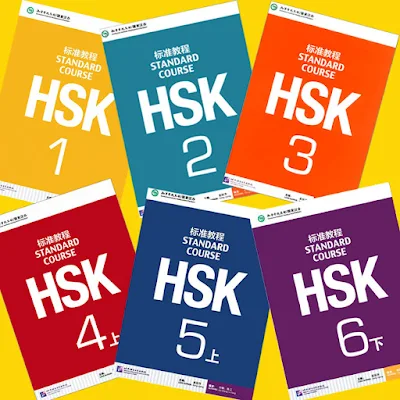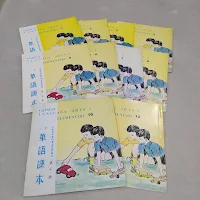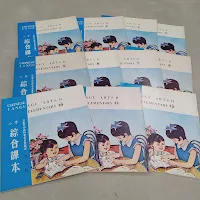Why I Think the Old Sinjiang Textbooks Were Written The Way They Were (and Why They're NOT Ideal for Contemporary Chinese Education)
The Chinese New Year's first day is over but for China, it's until Day 15. I feel like visiting a childhood trauma (which I laugh at now while remembering all the failing marks I had) because the whole program was based on parroting over understanding (read here). I even wrote about how the old Chinese textbooks can't be used for teaching Mandarin. Good thing that these dreaded textbooks are now out of print.
My memories are Grade 2 Chinese was strict and Grade 3 Chinese was even stricter. The Grade 3 Chinese teacher got the nickname of either Teacher Turtle or Teacher Fierce. Grade 4 Chinese teacher was also called Teacher Minus because she often said in Hokkien, "I will minus!" That threat came every time the class would misbehave. If I'm not wrong, I tried getting a minus 20 (for always talking) which caused me to fail another quiz. Some people would move out of a Chinese school when their child fails either Grade 2 or Grade 3. In our case, Grade 3 Chinese had more records of students held back. I even remember how someone failed Grade 2 Chinese four times. I mean, he was almost a "loyalty awardee". Good thing he finally left if those times were pure torture. Looking back, it's time to check out the fundamental flaws of the old Sinjiang textbooks and why they're best kept in a museum. Treat them like a Box Office Bomb where movie producers would learn from their mistakes.
I remember one point where we placed our own romanization. Back then, Pinyin wasn't taught but Zhuyin. Use the Zhuyin! I had to memorize the Zhuyin but the problem was, memorization after memorization was thrown. Let's talk about the two types of textbooks that may still spell D-R-E-A-D to some people.
Could the textbooks be written that way because the old Chinese Filipino community wanted to remain exclusive to their own?
Because unlike most people, the Chinese see the world in binary fashion: “us” vs “all the rest”, or “Chinese” vs “non-Chinese”. (concept of ”华”/“外”)Wherever they go in the world, they remain in their Chinese bubble, will never see themselves as “the foreigner”, but will see and brand the locals as “the foreigners”.As a consequence, even when abroad, they’ll continue living as if they were in China: socialise only with “compatriots” (华人, loosely translated as “country-people” or “自己人” our people), never speak the local language unless they really really have to, shop at chinese businesses as much as they can, not only for food but also other types of commodities (glasses, furniture, etc). This is true for long-term immigrants with usually low levels of education doing low-paying jobs like restaurants etc, but more surprisingly it also applies to university students or “foreign educated young professionals”. They only make friends with “their people”, hang out with “compatriots”.As a european, sometimes I ask myself whether everyday morning when a chinese person wakes up he or she looks at himself in the mirror and repeats “I am Chinese… I am Chinese…”, just as a reminder… as if they were either over-conscious of their national belonging, or insecure thereof. This is very difficult for me to understand but… that’s how they are!
This reminds me, some ethnic Chinese tend to have that "squatter mentality". What's the use of criticizing arrogant Pinoy squatters who can't get off their property, if ethnic Chinese have different citizenships but refuse to assimilate. For one, I've accepted the fact that I'm a 菲律賓人 華人 (Fēilǜbīn rén huárén). However, some Chinese Filipinos, back in the past, I'd say the boomers, would have their biases against other races. What's the use of complaining against people who are racist to Chinese people when there are Chinese people who only see the world in a binary fashion? The way the Chinese community spoke to Lee in The Bruce Lee Story reeks as much racism as the white guy who bullied Lee. I still believe Lee's influence went beyond his grave when he died at only 32. I really still wish Lee lived longer than that!
I think there's this ethnocentric mentality, wishing to keep the next generations as "pureblood Chinese". Some Filipinos have Chinese surnames but less than 50% Chinese blood. I guess that's what they're afraid of. Their next generation will not be Chinese by blood anymore. Well, a few half-Chinese people I know are married to ethnic Chinese. I have a half-Chinese schoolmate (whose father is a Filipino Malay and her mother is a Filipino Chinese) who's married to a Filipino Chinese. The issue was that Hokkien was strictly taught and enforced at home. It became a shame if Chinese Filipinos didn't know how to speak Hokkien. They were referred to as huan-a gong or literally stupid as a foreigner. In that case, I grew up thinking that huan-a equals ethnic Filipino. These days, I think I'd prefer to call the Malay people, huan-a. Maybe, the writers' assumption is that Chinese families will continue to teach their children to read and write in Hokkien. Maybe, even the more fatal assumption is that one must learn Hokkien before learning Mandarin. However, I soon ran into Han Chinese who speak Mandarin and English, but not Hokkien. I get thankful when I meet a Chinese who speaks Mandarin more than Amoy. Chances are these Chinese who speak Mandarin can speak English, even if it's broken. At least, I could get what might be a free 華語 (huáyǔ) lesson any time with such people. Some people brag about their Amoy but it's 華語 (huáyǔ) that has over a billion speakers. That's why I don't care too much about sharpening my Hokkien.
What happens is that Mandarin is taught as "some sacred language". However, we've got more Filipino huan-as (though I prefer to call them Filipino Malay, which is 菲律賓人 馬來人, read as Fēilǜbīn rén mǎlái én) enrolling the Chinese school. I remember one of them ended up crying a lot while memorizing the lines "新年, 新年, 快乐的新年" (Xīnnián, xīnnián, kuàilè de xīnnián). The Chinese teacher was always frustrated. Right now, I just assume Chinese teachers being strict and angry might be a result of them wanting system change but they don't get to have it. Maybe, it's because they're forced to use the faulty tools but want better tools. I can imagine them as a gardener who is given broken tools but has no choice but to work with them for a living. The Chinese principal can be viewed as the manager who's also forced to use the same broken tools. I think the child crying while memorizing it suffers from frustration because he didn't understand what he memorized. When the huan-as enter the Chinese school, they come from a family that doesn't speak Hokkien Chinese. As the level gets higher, the policy of kong lannang oi (speaking Chinese in Hokkien) gets strictly enforced. Teachers just have to do their jobs, right?
 |
| Keats School Blog |
Recently, I heard that Hokkien is no longer taught in the Chinese school. Maybe, this time, if I were caught speaking Hokkien or English, I'd have the Grade 6 Chinese teacher pointing at me saying, "說國語" (Shuō guóyǔ). Take note that 國語 (guóyǔ) is synonymous with 華語 (huáyǔ). I even had a few dreams where the Grade 6 Chinese teacher said, "說國語!" when I was talking in Hokkien in a conversational class. I then said, "老師,對不起" (Lǎoshī, duìbùqǐ) in my dream. It's because Hokkien is never necessary to learn Mandarin. People can learn Tagalog without learning another Filipino language (often called a dialect). Tagalog is the national language of the Philippines. Mandarin is the national language of China. It can be fun to learn other forms like Cantonese and Hokkien. Some delicious foods are known by their Cantonese names and Hokkien names.
Think about that Mandarin now has a billion speakers. Those books tried to seclude Mandarin. Today, Mandarin is now a language that anyone can learn. Like English, Mandarin is becoming more and more common. English was once considered a language just for Americans and the British. English became the universal language. Now, Mandarin is getting more widespread. The real issue is to make Mandarin more accessible. It must be taught as a second language instead. Forget about the nonsense of parroting Mandarin without understanding. That's what those old Sin Jiang textbooks ended up as. Either you get it or you don't. Chinese schools in the Philippines lost students. Most of them transferred to another school after repeating an early Chinese level more than once. That's what happened with a lot of them.
One could always speak how the Chinese language is essential. It's like how one can always speak of the importance of learning mathematics and science as part of life. If there's no real learning, then the learning is useless. Even a high score means nothing when the student learns nothing. That's why I felt dissatisfied with too much focus on grades. That's why I'm glad that the old Sin Jiang textbooks are now out-of-print. After all, Chinese should be taught as a second language in any non-Chinese country.


